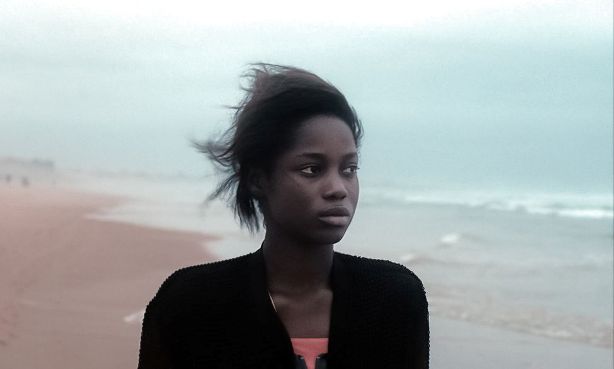 Mati Diop’s first feature tells of a young woman in Senegal, grieving the loss of her lover who died at sea trying to migrate for a better life, and then finding herself challenged by what seems to be the presence of spirits.
Mati Diop’s first feature tells of a young woman in Senegal, grieving the loss of her lover who died at sea trying to migrate for a better life, and then finding herself challenged by what seems to be the presence of spirits.
The central dramatic figure of our time is the migrant, whose shifting, uncertain, and perilous fate reflects that of our world. Atlantics, the first feature film by Mati Diop, expands that metaphor to include the grief and injustice experienced by women, whose oppression makes them refugees in their own family and society. Diop is the niece of the revered Senegalese director Djibril Diop Mambéty, and her film was widely anticipated at Cannes last year, not only because of her uncle, but due to her own excellent short films that led up to this one. Atlantics won the Grand Prix at Cannes, the second most important award next to the Golden Palm, which went to Parasite.
The film begins like a realistic social drama. We see a group of construction workers in Dakar, the large coastal city in Senegal, building a huge futuristic looking office building in the city, an incongruous structure in the midst of a poverty-stricken landscape. The workers cause a disruption when they demand their back wages in the paymaster’s office. They haven’t been paid for months, their debt is piling up, and many face eviction for non-payment of rent. Their demands are denied.
Our focus then narrows onto one preoccupied laborer, Souleiman, played by Ibrahima Tauroré. After work, he meets up with a young woman he is in love with, Ada, played by Mame Bineta Sane. They kiss and cuddle near the beach; she says that she has to go and will see him tonight; he seems like there’s something he wants to say, but can’t. It turns out that Ada has been promised in an arranged marriage to a man from a wealthy, conservative family. Her family and friends keep telling her how lucky she is, but she’s been sneaking out at night to go to a little club on the shore, where girls socialize with the construction workers, and where she met Souleiman. Later that night, she goes out, but learns to her dismay that the “boys” have all left on a boat, embarking on the ocean to find a better life in Spain, and for the time being providing for their girlfriends from there, and with luck eventually returning. But as time goes on, these hopes vanish. It appears that the young men’s boat has capsized, and they have all drowned at sea.
The dominant mode of storytelling in our world is linear, logical, and “left brain,” so to speak. In contrast, Diop and her co-screenwriter Olivier Demangel, practice what you might call “right brain” storytelling. Dialogue and scenes proceed by intuitive association; imagery conveys emotions that are not precisely formulated in words. The gentle, sometimes languid pace of Atlantics creates the sense of a world that has long existed prior to our awareness of it, and as the film goes on, this world is suffused with supernatural elements that are presented without being explained.
Just as Ada’s heart is torn by grief while she is forced to marry a man she doesn’t love, she receives texts on her phone that make her think Souleiman may be back in Dakar. A police detective shows up investigating a case of arson that he believes was committed by Souleiman. And could it be that the spirits of the young men drowned at sea have now possessed the women they left behind, demanding the justice, and the wages, that they were denied in life?
The belief in spirits is a traditional one in Senegal, as it is in many places, and although there are nay-sayers in the story, the movie presents our everyday reality as surrounded by otherworldly influences. This serves to embody, more than anything, the grief and loss of the women in this narrative, especially Ada, who commits herself to a personal quest that ultimately overrides all the pressures from her husband and family. There is tension also between the Muslim values of her traditional friends, and the secular desires for pleasure and liberation of her friends in the club. Diop does not try to make things easy for the viewer. She asks that we let go of our habitual ways of attention, and allow the subtle rhythms of this gorgeous film wash over us.
I saw Atlantics at a film festival last year. It’s now showing on Netflix. Although I’ve criticized Netflix’s marketing strategy for neglecting theatrical screenings, one advantage of their policies is that more people will have the opportunity to see exciting and innovative films like Atlantics, because it’s on Netflix, than they might otherwise. And that’s all to the good.

2017 was a horrible year, but the year in film wasn’t too bad. Chris Dashiell names his favorite 2017 releases. It’s that time of...

Joachim Trier’s drama about two daughters confronted with the father who abandoned them uses acting as a symbol of the ways adult children navigate...

Fritz Lang’s 1931 crime picture remains one of the greatest depictions of social rot ever put on film. Once in awhile I get asked...